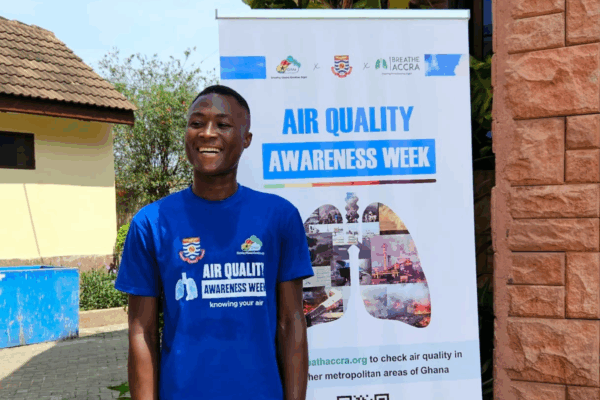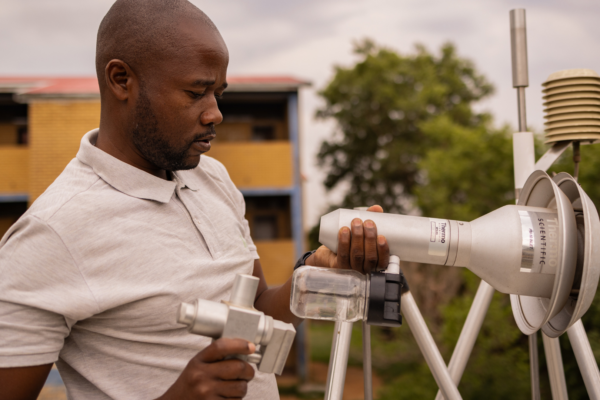In 2021, exposure to air pollution resulted in an estimated 1.2 million premature deaths and 54 million healthy years of life lost across the continent. With rapid urbanisation, population growth, and industrialisation, governments have the opportunity to invest in evidence-informed policies and measures that will influence future air pollution and its impacts on people and environments in Africa. Below, we highlight the progress and future directions towards clean air for all in Africa.
Closing the data gap
Many countries across Africa do not have enough air quality monitoring stations to adequately track air quality trends or characterise population exposure to air pollution. However, in the last decade, there has been a rapid increase in the deployment and use of a variety of tools, including a combination of reference-grade and low-cost air quality monitors, as well as remote sensing methods and atmospheric models.
Cities including Addis Ababa (Ethiopia), Dar es Salaam (Tanzania), Lagos (Nigeria), Kampala (Uganda), Kigali (Rwanda), and Nairobi (Kenya) have increased coverage for both regulatory and low-cost sensor air quality networks in recent years. Several of these efforts are driven by research-led collaborations:
- AirQo is providing data in over 16 cities across Africa.
- The Clean Air Catalyst partnership established two reference-grade monitors in Nairobi.
- Breathe Cities is expanding air quality monitoring in cities in South Africa, Ghana and Kenya.
- The EPIC Air Quality Fund is supporting 21 organisations in Africa, including Cameroon, the Democratic Republic of the Congo, the Gambia, Nigeria, Malawi, Mozambique, Uganda, and Zambia.
- Research partnerships such as CLEAN-Air Africa and DS-I Africa are expanding and strengthening infrastructure and technical capacity on the continent to conduct air quality monitoring and related health analyses.
Together, these efforts are helping fill critical gaps in a region where there are limited government-led monitoring activities. Such collaborative models have the potential to transform the air quality landscape in Africa, and generate crucial data for decision-making and tracking progress.
Scaling solutions across sectors and countries
The more we know about the causes and impacts of air pollution, the more we can target and boost measures to improve air quality. The good news is that the solutions are already known, and are increasingly being deployed by governments across local, national and regional levels. For instance:
- the city of Dakar, Senegal, launched a fully electric bus rapid transport system, a first in Africa.
- Uganda recently adopted the first National Air Quality Standards.
- In Rwanda and Kenya, KOKO Networks is enabling a transition to clean cooking solutions.
- African countries including Mali, Côte d’Ivoire, Nigeria, and Togo are leading the way on integrated action on air pollution and climate change through their Nationally Determined Contributions.
The Integrated Assessment of Air Pollution and Climate Change for Sustainable Development in Africa, with contributions from more than 100 researchers across Africa, laid out 37 actions across key sectors including energy, waste, transport, residential, and agriculture. A recent HEI review of the literature on health effects of air pollution in East Africa found that current evidence on the region, particularly with regard to respiratory health and children’s health outcomes, is broadly aligned with global evidence and can be used to inform policy decisions.
On a wider level, the Africa Clean Air Program (ACAP) is bringing together regional and local partners to address the twin challenges of air pollution and climate change. Platforms such as the Air Quality Management Exchange Platform, or AQMx, are also bolstering support, through curated resources to support governments, implementers and stakeholders on the path towards clean air action.
Strengthening partnerships for clean air action
The CLEAN-Air Forum in Nairobi, Kenya, is bringing together 300 actors to share data and evidence, and strengthen partnerships for tackling air pollution across Africa. The annual forum is an initiative of the Africa Clean Air Network launched in Kampala (Uganda) in 2023. The network is launching a renewed vision for partnerships, building on efforts over the last three years. The network’s approach to co-creating scalable solutions is grounded in a simple idea — local solutions drive lasting change.
For example, AirQo’s Africa-focused open-source platform is enabling data access across Africa, and government organisations, such as LASEPA in Lagos (Nigeria) and Nairobi City County are leading the charge in taking bold action on air pollution. Knowledge management efforts, such as HEI’s interactive database on air pollution and health literature in East Africa (LiNDA HEWA), and capacity strengthening through programs such as Eastern Africa GEOHealth Hub are expanding access to available data and evidence. By scaling up and amplifying such emerging initiatives, the network is fostering a shared framework for evidence-driven actions.
The case for clean air in Africa has never been stronger. We urge governments and funders to invest time and resources in strengthening and advancing local air quality work, and putting relevant experts at the forefront. This helps ensure that local contextual knowledge is considered, partnerships are equitable, and that the lessons can be broadly disseminated and used within the region. The Africa Clean Air Network is ready to collaborate – get involved.


